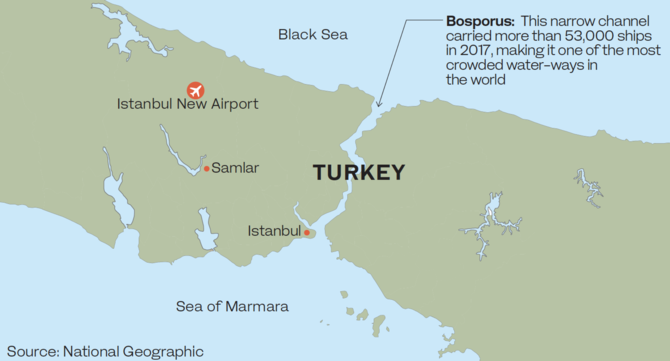
- ARAB NEWS
- 24 Apr 2024

Menekse Tokyay Ankara
Turkey is hoping to begin work on President Recep Tayyip Erdogan’s Canal Istanbul — a gigantic shipping project that even the Turkish leader has described as “crazy” — after the scheme was given an environment green light on Monday.
The mega-project will involve the building of a 45 km shipping canal on the edge of Istanbul that supporters say will rival the Suez Canal.
Viewed as a “signature project” by the ruling AKP government, the canal is expected to ease shipping congestion in the adjacent Bosphorus Strait and will carry up to 160 vessels a day when it is completed in 2025.
However, the scale and cost of the project have drawn criticism from several quarters, including Ekrem Imamoglu, Istanbul’s opposition mayor, who says the canal will have a devastating environmental impact and will be difficult to finance.
“This city is a gift of God. Do not betray this city,” he said last month.
Although his concerns have been dismissed by the government, Imamoglu is calling for a referendum on the project, which is expected to cost about $15 billion.
Erdogan has rejected the Imamoglu’s comments, saying: “The mayor is claiming Canal Istanbul is not suitable. Mind your own business.”
However, Yoruk Isik, an Istanbul-based independent geo-analyst, told Arab News that it is unclear if the Canal Istanbul project has received environmental clearance. “It’s more likely that the Turkish president is trying to jump the gun and declare victory on the issue,” he added.
Another concern is that the canal might jeopardize the Montreux Convention, the 1936 agreement that gives Turkey control over the Bosphorus and Dardanelles straits, limiting warships’ access to the strategic waterways.
Ilker Basbug, Turkey’s former chief of staff, criticized the canal scheme, saying that if conditions change under the project, member states could annul or ignore the convention.
The agreement allows civilian ships to use the straits in peacetime, but restricts warships’ access to the Black Sea.
But while the Bosphorus and Dardanelles — both natural waterways — are regulated by the convention, Canal Istanbul, as a man-made canal, would be overseen by Turkish authorities.
“The convention has prevented an arms race in the Black Sea and maintained peace,” Isik said.
According to Isik, Russia views the convention as vitally important to its security and economy, and will never agree to any changes in the agreement.
If the new canal is opened to warships, a serious political crisis could emerge with Russia, Isik said.
“From the historical Turkish perspective, the Montreux Convention (is one of) the founding documents of the Turkish republic. Opening it to discussion is self-defeating and could only be described as a short-sighted domestic policy maneuver,” he said.
The ambitious canal project will also incorporate new residential and business areas, leading critics to claim that it is a “real estate” project.
Financing of the canal in a country where economic deterioration has become widespread, is also a divisive issue.